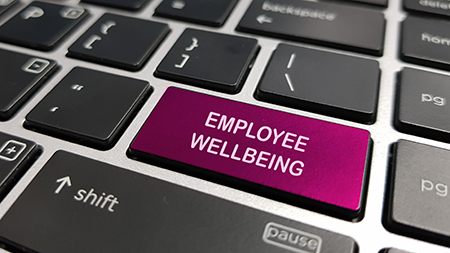Register now and start:
- Accessing PAR Training
- Shopping PAR products & tools
- Using online assessments with PARiConnect


Prioritizing mental health support has emerged as a crucial aspect of fostering a supportive work culture. The insights from the 2023 Work in America Survey conducted by the American Psychological Association (APA) shed light on the importance of psychological wellbeing in the workplace and the expectations of employees regarding support for their mental health. With the release of the Surgeon General’s Framework for Workplace Mental Health and Well-Being in 2022, the spotlight on this issue has only intensified.
With well over 2,000 hours spent at work per year, workplace mental health can have an extraordinary impact on our lives. As company leaders, let’s commit to exploring how we can foster a supportive mental health work culture so 100% of our employees feel safe and supported at work.
Speaking from personal experience as a leader, and having established a safe mental health work culture at PAR, here are five of my lessons learned that may help guide company leaders who are interested in advocating for and creating a supportive work culture for employees' mental health:
1. Lead with Empathy and Authenticity
As leaders, it's essential to lead by example and demonstrate empathy toward your team members. Authenticity breeds trust and creates an environment where employees feel comfortable expressing their emotions and concerns. Share your own vulnerabilities and struggles, showing that it's okay not to have it all together. By fostering a culture of openness and vulnerability, you create space for genuine connections and support. When choosing to be vulnerable and authentic, be thoughtful about where your boundaries lie, where there is a good division, and how this may vary for different people.
2. Prioritize Active Listening
Effective communication is key to supporting employees' mental health. Take the time to actively listen to your team members, showing genuine interest in their lives and wellbeing. Encourage open dialogue and create opportunities for employees to voice their concerns without fear of judgment. By actively listening and validating their experiences, you demonstrate that their mental health matters and that you're committed to supporting them. Once the active listening element is covered, I encourage going beyond this for specifics such as seeking tangible feedback and creating surveys with certain prompts to seek further and effective information.
3. Promote Work–Life Harmony
Striking a balance between work and personal life is essential for maintaining mental wellbeing. When possible, provide flexibility and autonomy to your team members. Encourage healthy boundaries between work and nonwork activities, respecting employees' need for downtime and relaxation. By promoting work–life harmony, you help prevent burnout and support overall mental health.
4. Clear Communication for a Sense of Certainty
Clear communication is the cornerstone of stability and support. Whether offering guidance or praise, providing clear and direct feedback ensures individuals feel valued and understood. Establishing clarity in direction fosters a sense of security. Embracing a feedback loop, whether delivering constructive criticism or acknowledging achievements, cultivates an environment of transparency and growth, where everyone knows where they stand, facilitating effective collaboration and personal development.
5. Foster a Culture of Inclusion, Belonging, and Safety
Create an inclusive work environment where every individual feels valued and respected. Foster a sense of belonging by embracing diverse perspectives and experiences, and challenging unconscious biases. Create opportunities for collaboration and teamwork, promoting a sense of community and support. By fostering a culture of inclusion and belonging, you create a supportive environment where employees feel empowered to be their authentic selves.

Walking the Walk
One personal example from my life was when a close relative passed away and I felt the wave of grief come, plus the pull and overwhelm from all the logistics that come with services and family gatherings, which are a top priority for me.
I wanted to be present at this difficult time for my family and I also needed some support. When I went through this grieving process, I had an open dialogue with key PAR team members as I chose to be transparent about what I was going through. This open communication helped to lay the foundation for future transparency and discussions about priorities and how we might lean on each other in difficult times.
By being vulnerable enough to share my own process, I led by example for when other team members may experience similar situations down the road.
Isn’t it better for all our mental health to know we are safe in sharing what we need?
This is the harmony of a supported team.
Employee Psychological Safety is Essential for Organizational Success
Creating a supportive work culture for employees' mental health is not only essential for their wellbeing but also for organizational success. By leading with empathy, prioritizing active listening, promoting work–life harmony, investing in mental health resources, and fostering a culture of inclusion, leaders can advocate for and create a workplace environment where every individual feels valued, supported, and empowered to thrive.
The results of APA’s 2023 Work in America Survey confirmed that psychological well-being is a very high priority for workers themselves. 92% of workers said they value organizations that care about their emotional and psychological well-being, and they want to work for organizations that provide support for their mental health.
Regrettably, a staggering 84% report that workplace conditions contribute to at least one mental health challenge.
To that end, here at PAR, we have made a commitment to employees to support their mental health and psychological safety, so they feel comfortable speaking up, raising concerns, and sharing in an appropriate and professional way.
In our annual engagement survey, 100% of PAR employees reported feeling safe at work.
Call to Action: This month, I advocate that company leaders strive to reach 100% of employees feeling safe at work by fostering a supportive mental health work culture.